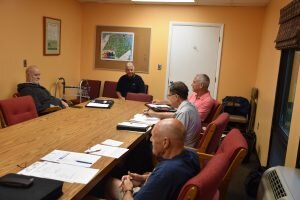By Greg Ellison
Staff Writer
(Sept. 12, 2019) Finalizing possible updates to resolution procedures left dormant for half a dozen years dominated the discussion during the Ocean Pines Association Bylaws and Resolutions Committee meeting on Friday.
OPA President Doug Parks attended the meeting as an association member.
Bylaws Chairman Jim Trummel welcomed his predecessor Jeff Knepper, who stepped aside for health reasons but was previously tasked with updating the resolution procedures.
Referencing changes in the resolution procedures language proposed in July, committee member

Taking part in the Bylaws and Resolutions Committee meeting on Friday were, clockwise former member Jeff Knepper, OPA President Doug Parks, Keith Kaiser, Committee Chairman Jim Trummel and Bob Hillegass.
said while the original focus was on advisory committees, the guidelines could be applicable for departments seeking changes.
“This procedure could be followed for any changes that are made in the bylaws by any entity,” she said.
Wahl said an ideal means to refresh advisory committee members about resolution processes would be to incorporate the topic while annual reports are being prepared for submission in October.
Parks said he is on the brink of scheduling an executive council meeting and could distribute any proposed procedural language revisions at that time.
Knepper said he deemed his earlier efforts as vital to maintain the Bylaws Committee’s objectivity.
“I don’t want to see this committee weaponized in a fight over some principle that directors have had in the past,” he said.
Avoiding repeat instances of people using the Bylaws Committee to promote a personal agenda is the goal, Knepper said.
“A nice, clear set of procedures that talk about what you can do,” he said.
Parks stressed the importance of using established lines of communication for resolution procedures, which involve advisory committees using a designated liaison to discuss matters with the board.
“I draw a very thick line in the sand between board responsibilities and operational responsibilities,” he said.
Trummel proposed altering the verbiage to define, “resolution change procedures.”
Wahl questioned if it is appropriate for advisory committees to suggest changes.
Parks said advisory committees could originate changes to bylaws and procedures.
“That’s one of their functions if they see something that needs to be brought to the attention of the board for consideration,” he said. “It’s an advisory committee to the board, it’s not just the board’s lapdog.”
Trummel said the resolution procedures, with the exception of an inconsequential amendment in 2015, date back to 2009.
“That was part of a resolution review started in 2008,” he said. “It is a combination of several different resolutions that had existed.”
Trummel said a principal reason for ongoing hesitation by many to undertake a resolution review process is the issue of outside use of association facilities.
“That is at least a below-the-surface issue,” he said.
Knepper said the non-exclusivity is tied to the association’s tax-exempt status.
“If we close it off to the public, one of the risks is our tax-exempt status might be lost,” he said.
The potential fiscal impact needs to be closely analyzed, Knepper said.
“The people that complain, ‘we pay and it’s open to the public,’ the answer is yes we do, but we do that to preserve our tax-exempt status, which we think is kind of important.”
Trummel suggested a presentation on the associations’ tax-exempt status would be appropriate in the near future.
